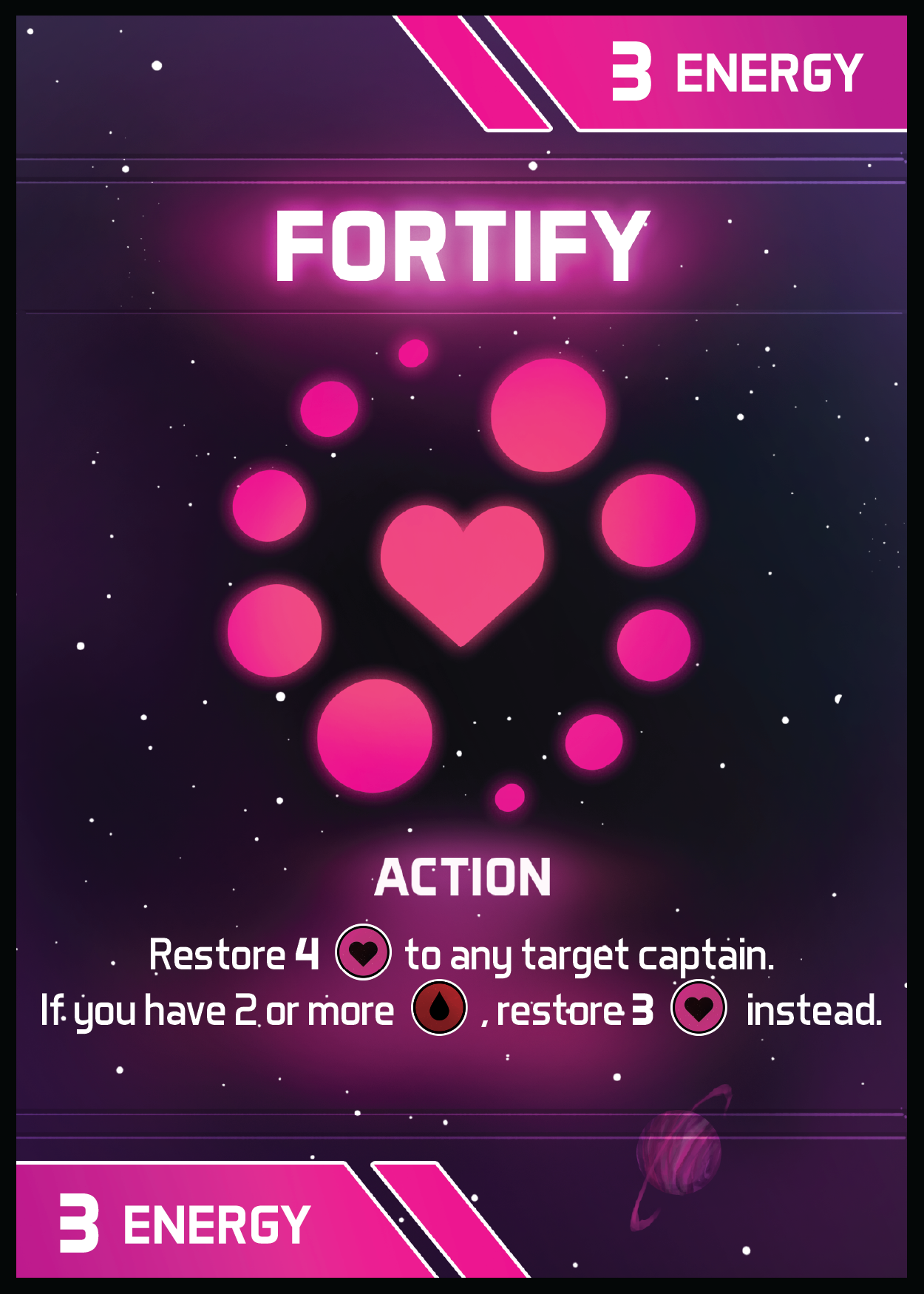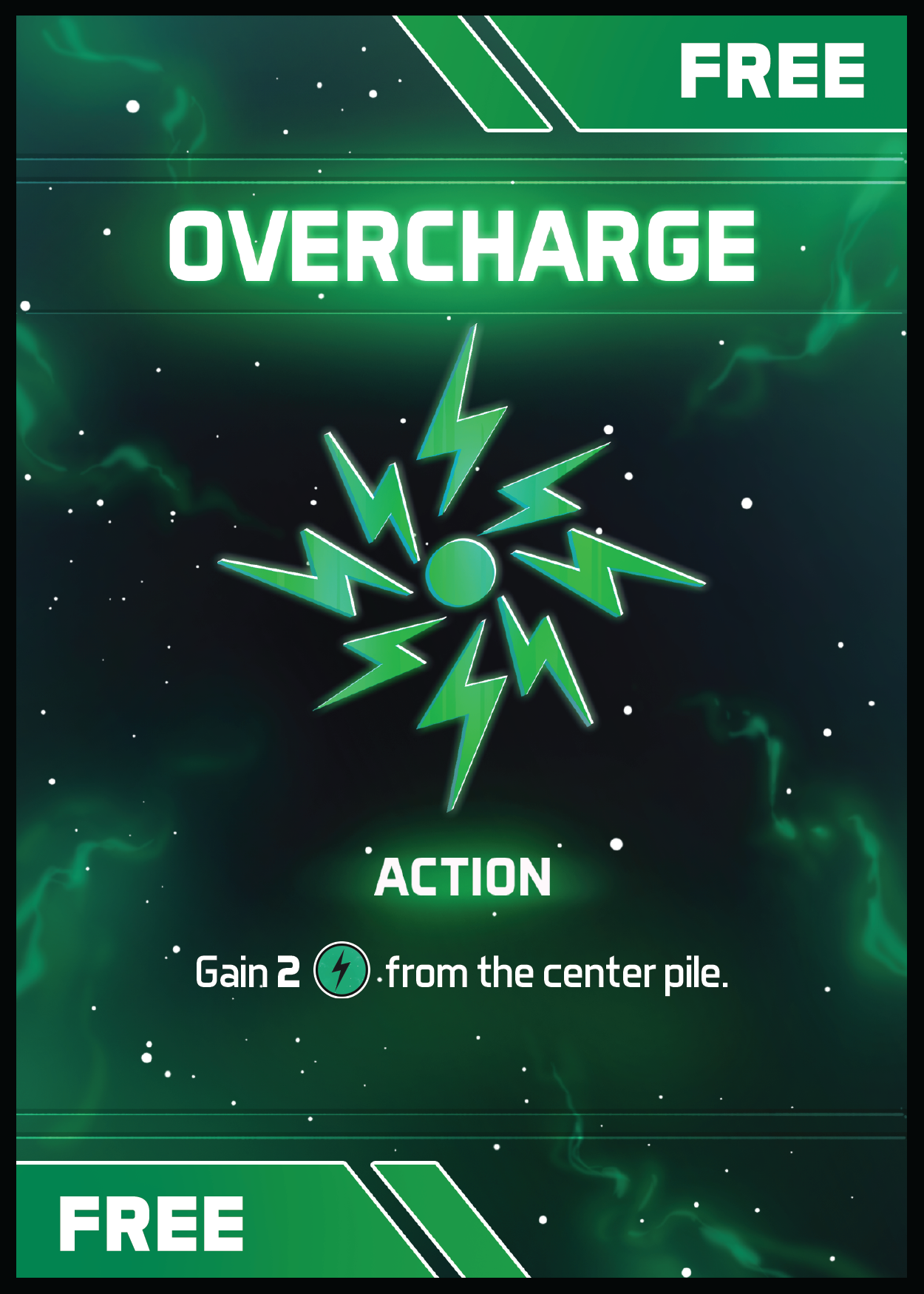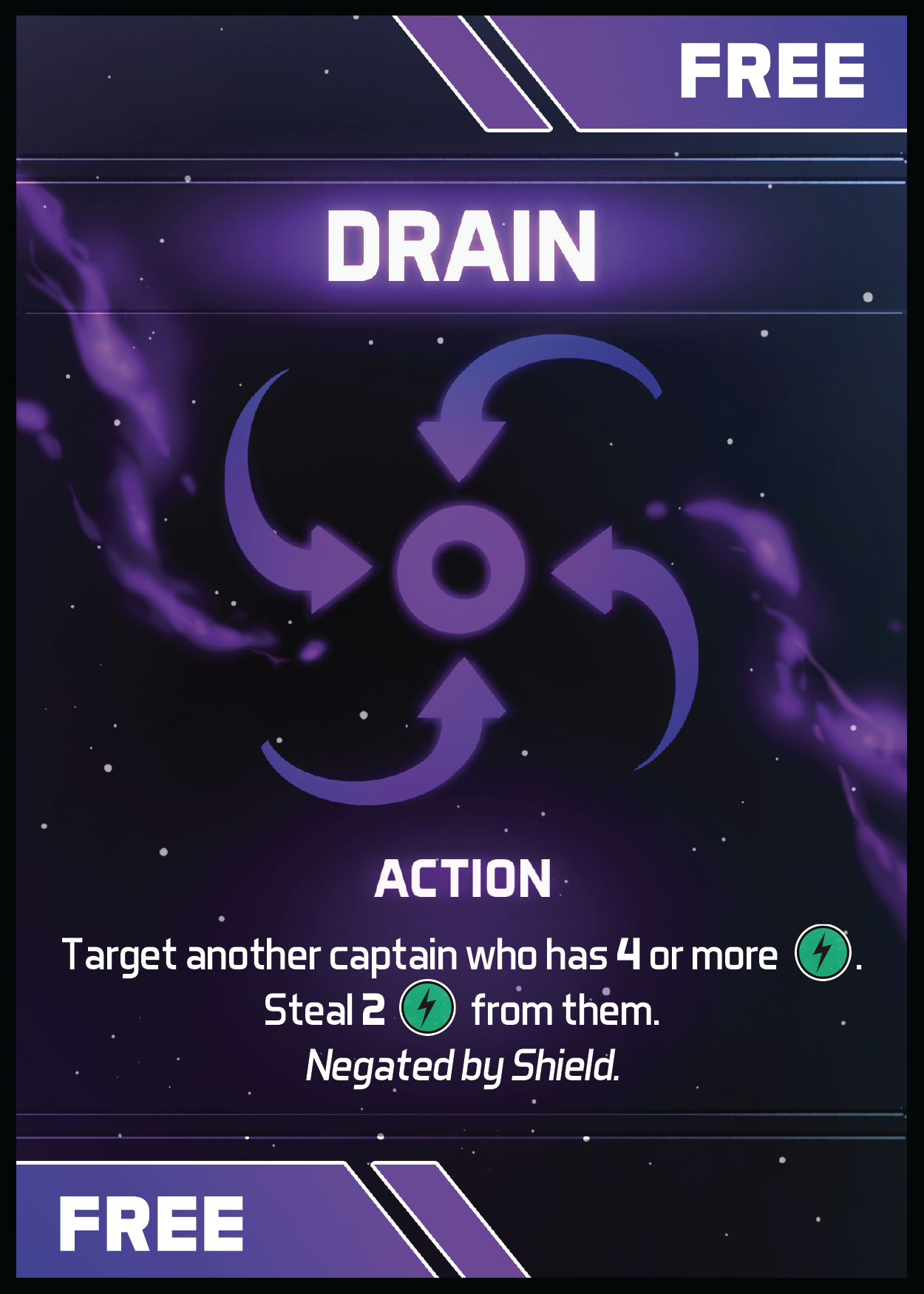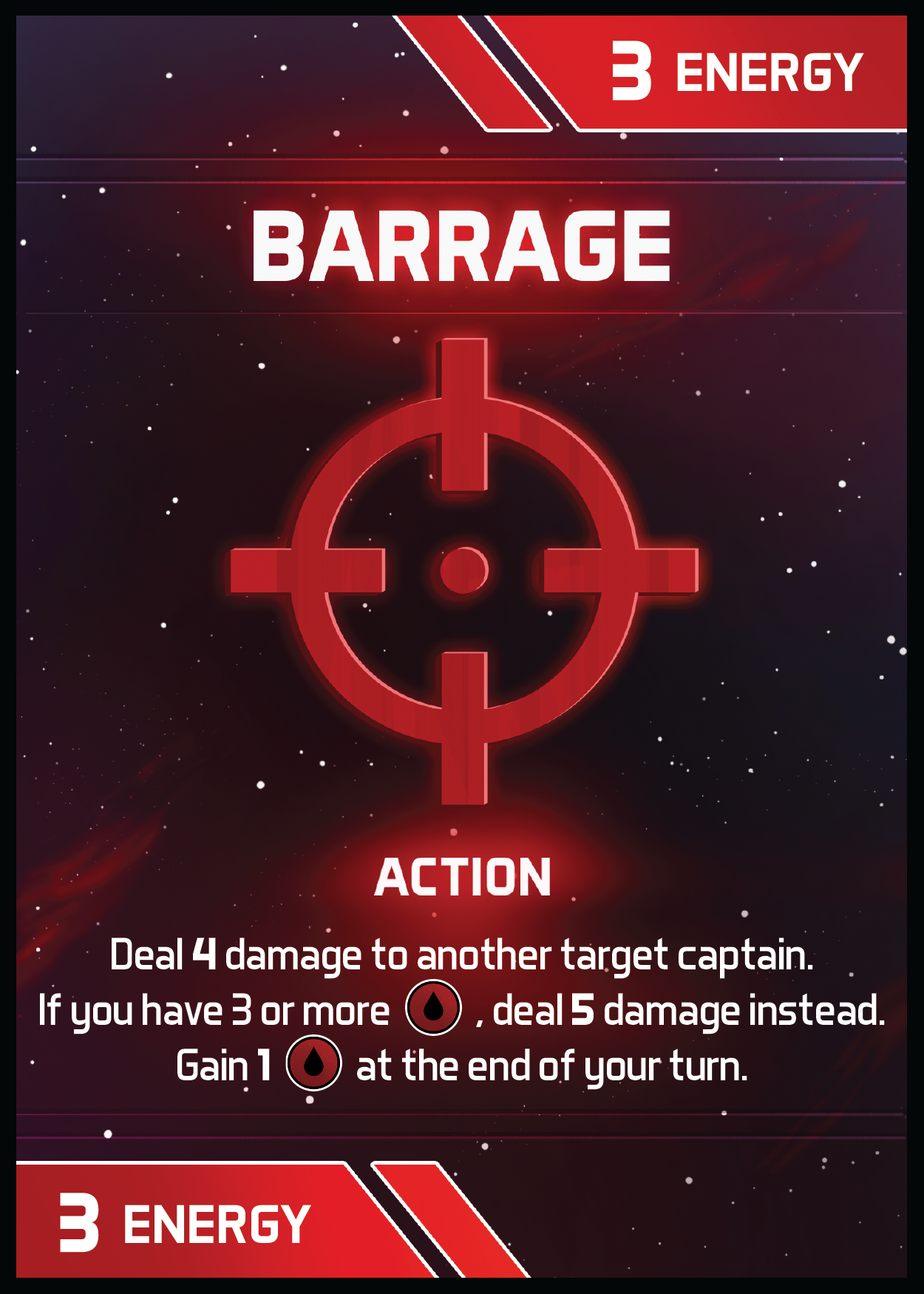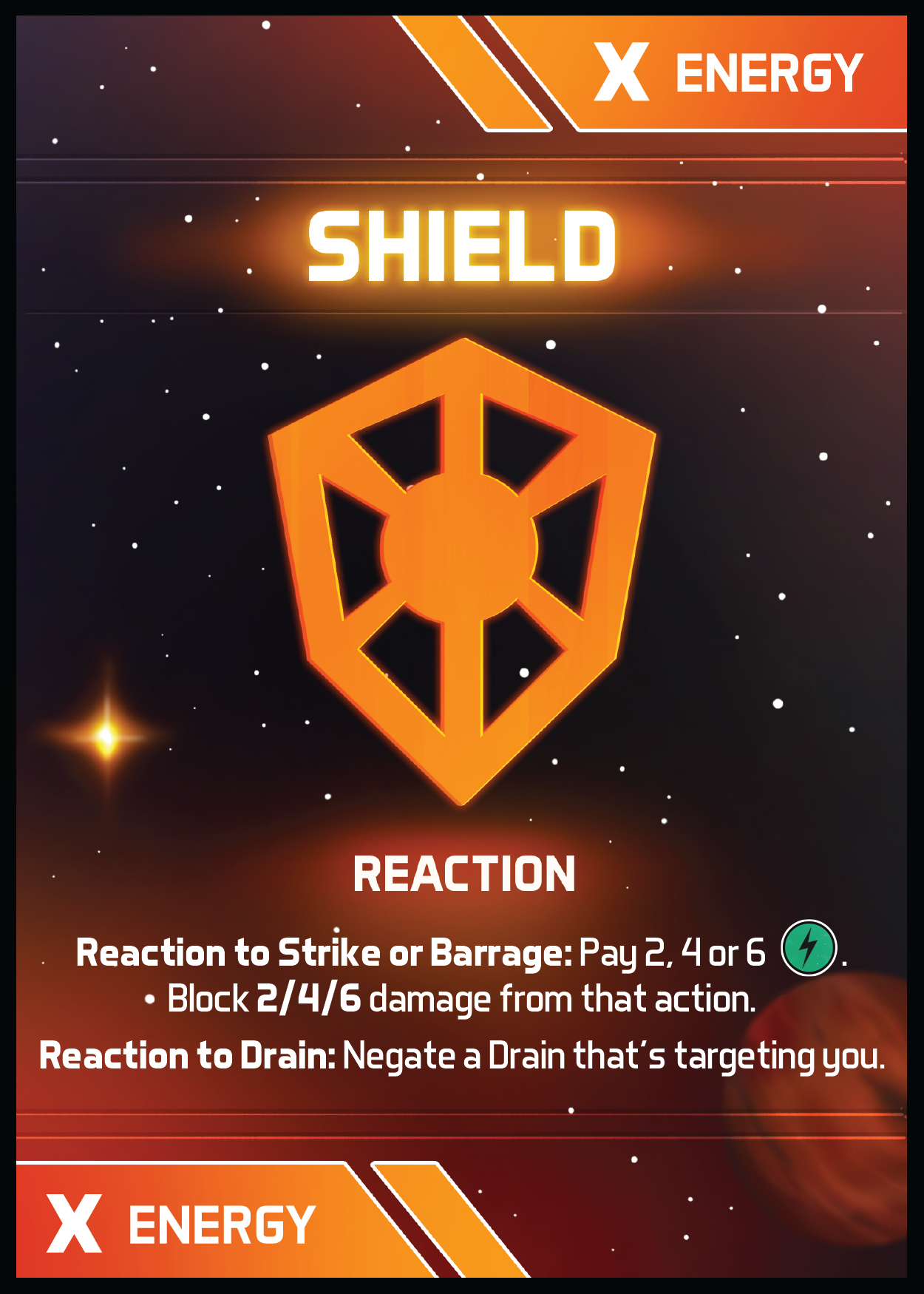Hailing from A Midsummer Night’s Dream, Puck is our resident expert in sabotage. This little guy may look innocent, but if you don’t know how to approach his playstyle, you’ll have a nightmare on your hands.
The toughest part of starting a game as Puck is deciding where to even begin, just because there are so many different ways to play. Puck has one of the most unique playstyles in the game, and as a result, it can be hard to get into his head.
I often see new Puck players make a common mistake where they hoard energy and Network each round. They tend to play “passively” to avoid rocking the boat. Unfortunately, while that strategy might help you survive a few rounds, it actually makes the game more likely to end before round 12.
That’s because when you do nothing, you’re letting other captains do whatever they want. You’ll let them get an early win, which means an early loss for you.
If you’ve only played Puck passively, and are now saying “Wow I stink”, don’t worry: now’s your chance to master the most chaotic chlorophyll in the galaxy.
Madness Methods
Your Puck cheat sheet
How to become the agent of chaos
When to say you’re Puck
How to be unpredictable
How to leverage each permit
Your Puck cheat sheet
Learn what your opponents need to do.
Distract your opponents from their goals by making them deal with bigger problems first. (E.g. attack someone to force them to heal. Heal someone to make others attack them.)
Mislead your opponents to assume you’ll act one way, then waste their turns by doing the opposite of whatever they expected.
Gain a health & energy advantage over your opponents.
Once you’re close to round 12, use your identity to encourage people to wait just a few more rounds. Use your energy & health advantage as a threat.
How to become the agent of chaos
If you’ve played other board games before, it may be helpful to think of Puck from the perspective of “action economy”. Basically, each player gets a maximum of 12 turns per game, and as Puck, your goal is to sabotage as many of those turns as possible.
The funniest thing about Puck is that the best way to play him also happens to put you in the most danger of total self-sabotage. It sounds weird, but you actually want to be in a position where you may accidentally backflip into your own loss.
That’s because your biggest “value” plays happen when you let someone get really close to their goal before invalidating all of it. If you interfere with someone who is very far away from their goal, they have ample time to correct their course, but if someone thinks they have everything lined up, that puts you in a great position to ruin it all - but it also means you might slip up and actually let them win.
Your biggest priority when playing Puck is to figure out who looks like they’re closest to winning, and then set them back as efficiently as possible. You have to mess up captain A, yes, but you don’t want to spend so much effort and energy that you’re powerless to stop captain B.
For example, if someone looks like they might Reveal as Lady Macbeth soon, you could stop them by killing them with two Barrages. But what if Prospero chooses to Reveal afterwards, and you suddenly have zero energy to deal with him? Your best chance is to only Barrage this potential-Lady-Macbeth once, since that should be enough to discourage a Reveal, and then you can save your energy for a potential Prospero reveal later.
You may have trouble learning how to delay one person without simply tossing the win to someone else. When you’re just starting, I recommend just making sure that your attacks never bring captains to 4 or less health. That small rule should save you from most unexpected losses, though there are other red flags like allowing captains to hoard too much energy.
When to say you’re Puck
Declaring yourself as Puck is not a great strategy early in the game. However, it definitely makes for a winning great strategy later on. Knowing when to enter the limelight is one of many skills you’ll develop each time you play Puck, and your timing will make a big impact on how each game unfolds.
You may be tempted to announce your identity early on, because assuming Hamlet or Brutus didn’t mark you, you can technically win alongside any non-dominator captain. Since you can technically make friends, you may be compelled by the idea that perhaps everyone can just chill out and have a good time for a few rounds.
In practice, when you declare your identity too soon, captains can’t really do anything about your declaration, so you don’t actually get anywhere. Sure, many captains can win on round 12 with you, but most of these captains will need to attack each other first to prepare for victory. So even if they want to eventually team up with you, they’ll have to play the game like usual for 10 rounds first.
The problem is this: even if everyone wants to win with you, players will notice which captain is most likely to win if the game gets to round 12. They can’t all win, after all. Those observant players will recognize when their best shot of winning is to make an early gambit. Then, when they set up their play, they’ll easily factor your opposition into their plans.
Essentially, if you declare your Puck identity too early, you don’t get much benefit, and it comes at the cost of really good sabotage opportunities.
At some point, though, it’s true that you’ll want to mention that you’re Puck in order to secure an alliance with other captains.
A decent starting rule you can follow is to use your identity as a ‘secret weapon’. If none of your other stall tactics have worked, and you’re worried that you’ll lose unless you say something, then you can pull out the old “Actually, I’m Puck” tactic.
The reason you want to leave it to the last second is because having an ambiguous identity can let you play all kinds of fun identity games in the meantime - sometimes you can accelerate through two or more rounds just by tricking people into thinking you’re somebody else.
How to be unpredictable
I happened to play Puck just last weekend. I like aggressive gameplay, so I lobbed Barrages almost every turn until someone asked if I was Lady Macbeth. “I do like blood,” I said, peeking at my captain card. “But I’m not Lady Macbeth.”
I wanted to trick an actual Lady Macbeth or Prospero into thinking I was Iago. The hope was for one of them to attempt a premature Reveal, wasting a round at the table as I backstabbed them. But nobody took the bait, so I pivoted to a new strategy - on my next turn, I Fortified the player who already had the most health, bringing them from 10 health to 14.
A player with 6 health and two Loyalty tokens didn’t love that: “Dude, what? Why would you do that?”
“I’m Iago,” I repeated, “and I think they’re Prospero. I can win with them if that’s the case.”
The 14-health player replied, “I’m not Prospero!”
But the next player was targeting them anyway. “Either way, you have way too much health, so I’m going to Strike you.”
The table quickly devolved into accusations, and more importantly, my opponents spent the round piling onto one captain instead of finishing their own win conditions. Stall successful.
Making chaos and confusing players isn’t just a fun way to roleplay as Puck, but it’s actually a meaningful method to stall the game.
That’s because strategies are built on expectations: in order to make a strategy, your opponents must anticipate and imagine the handful of realistic events that may happen. Unless you do something about it, your opponents will succeed if everything goes how they expect it. That’s where your chaos comes in.
Each time you break expectations, you force someone to spend a turn re-orienting. You scare them into making safe plays that take longer. And, in the best scenarios, you mislead your opponents to take bad actions that they think will make them win, under false assumptions that you had the pleasure to create.
For an example of chaos: let’s say you’re Puck, and a player with high blood is at 6 health. If you make it “obvious” that you want to kill them, implying that you’re Portia, then other players may scramble to deny you the kill by murdering this high-blood player themselves. Without using up any actions yourself, these players can waste their turns (and even kill a captain) instead of spending their energy and actions advancing their own objectives.
I mentioned earlier the comment about self-sabotage: our above strategy could easily blow up in our faces if one of the players co-ordinating to stop Portia is the real Portia. You would hand them a win right there. But those odds would be low, and if your ploy succeeds, your play would buy you at least two rounds of time. A worthy gambit.
If you want to create moments like these yourself, here’s the secret: Don’t be random.
Instead, be subversive. Be unpredictable.
Don’t just attack players at random. Attack the same player twice, then heal them on your next turn. Players can eventually work around one player doing things at random. If you want to truly disrupt somebody, you must first set up expectations, hold them for a moment, then absolutely destroy them.
How to leverage each permit
Overcharge
Energy is the root of action.
The only* way captains can end the game is if they spend energy at some point - whether it’s on Strikes and Barrages, or their own Reveal.
You will seldom see a captain win on a turn where no energy has been spent. So, if you want to delay captains, delay their energy.
Having Overcharge cards is okay for your own use, but more importantly, each Overcharge you hold denies someone else from holding it. You can then call bluffs on other players’ Overcharges, and in the best-case scenarios, your confidence will encourage other players to use slower actions like Charge.
Overall, Overcharge isn’t particularly better for Puck than other captains, but if you can use your Overcharges to call bluffs, you can really stall out the game depending on how early you can get an Overcharge monopoly going.
*Using bluff calls, you can technically win without ever spending energy - but I’ve never seen it happen.
Drain
If energy is action, then to reduce energy is to reduce action. You can recognize potential action by tracing energy flows, by watching who collects it and who does not. And if you fear the one with lots of energy, Drain them.
Drain actually has incredible value, granting you the benefit of an Overcharge as well as eliminating at least one turn from an opponent. Some captains care more about gaining energy than messing with whoever they Drained from, but Puck is actually specifically interested in messing up other players.
Drain is a perfect way to slow somebody down because not only do you gain energy to delay somebody, but you also avoid accidentally helping somebody like Portia, Hamlet or Brutus get closer to murder.
Drain is likely Puck’s highest-value card, despite the uncertainty of getting negated by Shield. The only downside is if you lean too heavily on Drain, your opponents will respond by making sure to spend energy before it goes over 4. That would make your actual Drain card pretty useless. Try to stay unpredictable with your Drains to keep your value train rolling.
Barrage
With the exception of Cordelia / King Lear, dead captains can’t win the game. You make an excellent harbinger of death for two reasons: first, you eliminate a potential winner from the game. Second, if you are the sole killer of another captain, you get to prevent assassin captains like Hamlet, Portia and Brutus from winning at the same time. In the case of Hamlet and Brutus, eliminating their targets will just kill them outright - how efficient of you!
You don’t need to murder captains to reap the benefits of pain. Damaged captains become cautious, fearful to make gambits. This lets you steer the pace of the game. Of course, some players may want to hurt you back, but I would happily trade some health in exchange for slower plays that keep the rounds ticking.
The only caution with this strategy is that you occassionally want more captains hanging around to help you threaten attacks. For example, you may need to keep some people alive in case Lady Macbeth Reveals herself - if only two captains can oppose her, she’s pretty likely to win, but surviving three or four opponents is much harder.
Overall, Barraging your opponents is a great strategy in the right circumstances. Just don’t mindlessly murder everyone at the table in case you accidentally help someone else win.
Whether you use your Barrages or not, holding onto the permit cards can be a great way to slow down the game. Not only can you just negate a few Barrages entirely with bluff calls, but captains will then be forced to use Strike, making any murder-plans take twice as long to develop.
Fortify
Fortify is Barrage’s evil twin. Or maybe the good twin? Fortify generally negates Barrages, so it works well to de-escalate violent situations at any rate.
The funny thing about Fortify is that it doesn’t just raise health: for some reason, it also makes other players re-evaluate whether or not they should hurt someone. If you Fortify somebody with low health, even if everyone wanted to kill them before, sometimes everyone will just walk away like they weren’t thirsty for blood just two turns ago. If you suspect a captain may benefit too much from the murder of someone else, one Fortify could be your key to breaking their advantage before it’s too late.
Meanwhile, if you Fortify someone who already has 10 or more health, every player suddenly lights up, happy to have someone to smack. If you find that people have too much energy, giving them an excuse to spend it can be a useful way shave some turns from the game. If the high-energy players clearly don’t have Barrage, and have to spend two strikes to match your one Fortify, this deal is even better.
Shield
Shielding yourself isn’t really that important. However, shielding other players has the delightful effect of confusing everyone at the table.
For example, Shielding someone may cause players to think you’re Romeo and Juliet. They may resolve to murder “Juliet” (aka, the random person you Shielded for no reason) to “stop you two from winning”.
There is a bit of skill in when to Shield, though. The only reason someone would shield a captain in earnest is when they need them for their own objective. That means if you shield someone who’s taking damage at 10 health, you’ll probably make it too obvious that you’re Puck trying to be “random”. Instead, shield someone who’s in realistic danger of death. That would make the table re-evaluate their plans and make inefficient plays based on their assumptions about you.
Network
It’s a common play for new players to Network every round until they lose. Don’t do that. Strategic Networks, though, can really be powerful for you.
This is because Puck has special reason to call out bluffs - a bluff call deals more damage than a Strike, but for zero energy, and it makes the opponent forfeit their action.
Because you want to maximize your own efficency, and make things really inefficient for everyone else, successful bluff calls provide a ton of value to yourself specifically. If you can somehow convince other captains to call each other’s bluffs, the benefit is just as good to yourself - each successful bluff call represents a missed turn, bringing you ever-closer to that final round.
With smart use of the Network permit, you can gather lots of information about what permits may be in each player’s hand.
Network is also valuable for social perception. Network is low-impact, so taking a turn with the permit deck can cool you down a bit and lower your profile. That can be valuable if players start to catch on to the fact that you’ve been sabotaging them for the past five rounds.
Overall
Puck can be one of the more intimidating captains to play in Captain’s Gambit because his objective is so broad. But the next time you play, you’ll know that his secret is to basically be as antagonistic as possible without dying.
Understand your opponents, sabotage whatever they need to do, and eventually co-ordinate a victory once you get close to round 12. And embrace the chaos! Somehow, I’ve found the more fun you have as Puck, the more likely you’ll succeed. Do whatever seems funny, and I bet you’ll instinctively end up becoming the perfect agent of chaos.





